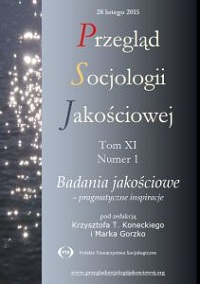Czy teoria ugruntowana wymaga ponownego odkrycia? Esej recenzyjny
DOI:
https://doi.org/10.18778/1733-8069.11.1.04Słowa kluczowe:
Odkrywanie teorii ugruntowanej B. Glasera i A. Straussa, metodologia teorii ugruntowanej, tradycyjna teoria ugruntowana, konstruktywistyczna teoria ugruntowana, wyobraźnia socjologicznaAbstrakt
Tekst zawiera omówienie książki Barry’ego Gibsona i Jana Hartmana Rediscovering Grounded Theory (2014) na tle dyskusji w obrębie metodologii teorii ugruntowanej. Szczególna uwaga poświęcona jest próbie rekonstrukcji „oryginalnej wersji” teorii ugruntowanej dokonanej przez autorów i związków tej metodologii z wyobraźnią socjologiczną oraz dyskusji, jakiej Gibson i Hartman poddają główne założenia konstruktywistycznej teorii ugruntowanej.
Pobrania
Bibliografia
Blumer Herbert (2007) Interakcjonizm symboliczny. Przełożyła Grażyna Woroniecka. Kraków: Zakład Wydawniczy Nomos.
Google Scholar
Bryant Antony, Charmaz Kathy (2007a) Introduction. Grounded Theory Research: Methods and Practices [w:] Bryant Antony, Kathy Charmaz, eds., The SAGE Handbook of Grounded Theory. Los Angeles, London, New Delhi, Singapore: Sage, s. 1‒28.
Google Scholar
Bryant Antony, Charmaz Kathy (2007b) The SAGE Handbook of Grounded Theory. Los Angeles, London, New Delhi, Singapore: Sage.
Google Scholar
DOI: https://doi.org/10.4135/9781848607941
Charmaz Kathy (2000) Grounded Theory: Objectivist and Constructivist Methods [w:] Yvonne Lincoln, Norman K. Denzin, eds., Handbook of Qualitative Research. Thousand Oaks: Sage, s. 509–535.
Google Scholar
Charmaz Kathy (2009) Teoria ugruntowana: Praktyczny przewodnik po analizie jakościowej. Przełożyła Barbara Komorowska. Warszawa: Wydawnictwo Naukowe PWN.
Google Scholar
Clarke Adele E. (2005) Situational Analysis: Grounded Theory After the Postmodern Turn. Thousand Oaks, London, New Delhi: Sage.
Google Scholar
Corbin Juliet, Strauss Anselm L. (2008) Basics of Qualitative Research: Techniques and Procedures for Developing Grounded Theory. Los Angeles, London, New Delhi, Singapore: Sage.
Google Scholar
DOI: https://doi.org/10.4135/9781452230153
Denzin Norman K. (2007) Grounded Theory and the Politics of Interpretation [w:] Antony Bryant, Kathy Charmaz, eds., The SAGE Handbook of Grounded Theory. Los Angeles, London, New Delhi, Singapore: Sage, s. 454‒471.
Google Scholar
DOI: https://doi.org/10.4135/9781848607941.n21
Dey Ian (1999) Grounding Grounded Theory. Guidelines for Qualitative Inquiry. San Diego: Academic Press.
Google Scholar
DOI: https://doi.org/10.1016/B978-012214640-4/50011-5
Gibson Barry, Hartman Jan (2014) Rediscovering Grounded Theory. Los Angeles, London, New Delhi, Singapore. Washington: Sage.
Google Scholar
Glaser Barney G. (1978) Theoretical Sensitivity: Advances in the Methodology of Grounded Theory. Mill Valley: Sociology Press.
Google Scholar
Glaser Barney G. (2002) Constructivist Grounded Theory? „Forum: Qualitative Social Research”, t. 3, no. 3 [dostęp 15 sierpnia 2014 r.]. Dostępny w Internecie http://www.qualitative-research.net/index.php/fqs/article/view/825
Google Scholar
Glaser Barney G., Strauss Anselm L. (1965) Awareness of Dying. Chicago: Aldine de Gruyter.
Google Scholar
Glaser Barney G., Strauss Anselm L. (1967) The Discovery of Grounded Theory: Strategies for Qualitative Research. New York: Aldine de Gruyter.
Google Scholar
DOI: https://doi.org/10.1097/00006199-196807000-00014
Glaser Barney G., Strauss Anselm L. (1968) Time for Dying. Chicago: Aldine de Gruyter.
Google Scholar
DOI: https://doi.org/10.1097/00000446-196812000-00048
Glaser Barney G., Strauss Anselm L. (1971) Status Passage. Mill Valley: Sociology Press.
Google Scholar
Glaser Barney G., Strauss Anselm L. (2009) Odkrywanie teorii ugruntowanej: Strategie badania jakościowego. Przełożył Marek Gorzko. Kraków: Zakład Wydawniczy Nomos.
Google Scholar
Gorzko Marek (2008) Procedury i emergencja: o metodologii klasycznych odmian teorii ugruntowanej. Szczecin: Wydawnictwo Uniwersytetu Szczecińskiego.
Google Scholar
Gorzko Marek (2009) Wprowadzenie do wydania polskiego. Przeciw „weryfikatorom”: Projekt metodologiczny „Odkrywania teorii ugruntowanej B. Glasera i A. Straussa” [w:] Barney G. Glaser, Anselm L. Strauss Odkrywanie teorii ugruntowanej: Strategie badania jakościowego. Kraków: Zakład Wydawniczy Nomos, s. XXXI–XL.
Google Scholar
Gorzko Marek (2010) „Drugie pokolenie” teoretyków Grounded Theory. „Studia Sociologica”, nr 20, s. 27‒43 [dostęp 28 stycznia 2015 r.]. Dostępny w Internecie http://usfiles.us.szc.pl/pliki/plik_1326813161.pdf
Google Scholar
Hammond Phillip (1964) Sociologists at Work. Essays on the Craft of Social Research. New York: Basic Books.
Google Scholar
Hood Jane C. (2007) Orthodoxy vs. Power: The Defining Traits of Grounded Theory [w:] Bryant Antony, Kathy Charmaz, eds., The SAGE Handbook of Grounded Theory. Los Angeles, London, New Delhi, Singapore: Sage, s. 149‒164.
Google Scholar
Konecki Krzysztof T. (2012) Wizualna teoria ugruntowana. Podstawowe zasady i procedury. „Przegląd Socjologii Jakościowej”, t. 8, nr 1, s. 12–45 [dostęp 28 stycznia 2015 r.]. Dostępny w Internecie http://www.qualitativesociologyreview.org/PL/Volume18/PSJ_8_1_Konecki.pdf
Google Scholar
Lofland John i in. (2006) Analyzing Social Setting: A Guide to Qualitative Observation and Analysis. Belmont: Wadsworth/Thomson Learning.
Google Scholar
Marciniak Łukasz (2012) Deskryptywna teoria ugruntowana, Klasyczna teoria ugruntowana, Konstruktywistyczna teoria ugruntowana [w:] Krzysztof T. Konecki, Piotr Chomczyński, red., Słownik socjologii jakościowej. Warszawa: Difin, s. 53–56; 127–130; 137–140.
Google Scholar
Strauss Anselm L., Corbin Juliet (1990) Basics of Qualitative Research: Grounded Theory Procedures and Techniques. Thousand Oaks: Sage.
Google Scholar
Timmermans Stefan, Tavory Iddo (2007) Advancing Ethnographic Research through Grounded Theory Practice [w:] Antony Bryant, Kathy Charmaz, eds., The SAGE Handbook of Grounded Theory. Los Angeles, London, New Delhi, Singapore: Sage, s. 492‒512.
Google Scholar
Pobrania
Opublikowane
Jak cytować
Numer
Dział
Licencja

Utwór dostępny jest na licencji Creative Commons Uznanie autorstwa – Użycie niekomercyjne – Bez utworów zależnych 4.0 Międzynarodowe.














